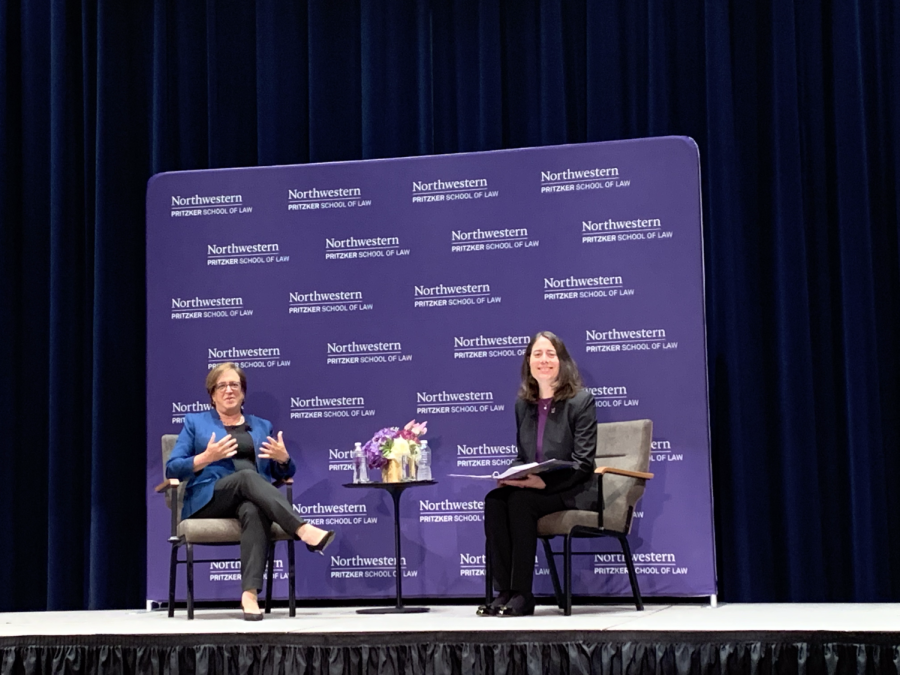Justice Elena Kagan talks Supreme Court legitimacy at Pritzker School of Law
Hannah Feuer/The Daily Northwestern
Supreme Court Justice Elena Kagan participated in a discussion with Pritzker Dean Hari Osofsky on Wednesday.
September 15, 2022
Supreme Court Justice Elena Kagan spoke about the legitimacy of the Court, her judicial philosophy and her career trajectory in a Wednesday discussion at the Pritzker School of Law.
Kagan, who entered and exited the auditorium to standing ovations, spoke with Pritzker Dean Hari Osofsky about the high bar she believes the Court should use when overturning precedent — alluding to, but never directly mentioning, Dobbs v. Jackson Women’s Health Organization, the case that eliminated the constitutional right to an abortion in June.
“If there’s new members of the court, and … all of a sudden very fundamental principles of law are being overthrown … then people have a right to say, ‘What’s going on there?’” Kagan said. “That just seems as though people with one set of policy views are replacing another.”
Kagan spoke as this year’s Howard J. Trienens Visiting Judicial Scholar, a program in which Pritzker annually invites a leading jurist to lecture at the law school. This year marked Kagan’s second as a Trienens Scholar after she first spoke at Pritzker in 2015.
About 600 people attended the event in person, with more watching from two overflow rooms where the discussion was livestreamed.
When she discusses the legitimacy of the Court, Kagan said she does not refer to whether the Court’s opinions are popular, but rather whether Americans have an underlying sense that the Court is doing its job.
She said judges on the Court must uphold three main principles in order to maintain legitimacy: abide by precedent except in unusual circumstances, apply judicial methodologies consistently and commit not to involve the Court in matters on which it doesn’t have to rule. Kagan said originalism — the idea that judges should look to the original, publicly understood meaning of the Constitution — doesn’t work in application because the philosophy is inconsistent with the way the Constitution was written.
“(The framers of the Constitution) knew that they were writing for the ages … and so they wrote in broad terms,” Kagan said. “They couldn’t possibly have thought that 250 years later people would be going, ‘What exactly did they mean when they said equal protection of the law?’”
Carlos Estrada, a third-year law student, said he found Kagan to be charming and funny. Even though she didn’t reference the Dobbs decision directly, he said he found her comments on stare decisis — the doctrine that courts should adhere to precedent — very telling.
“The message is sort of trying to get the Court back to a place where we can trust it, and that it’s going to make decisions based on law and not politics,” Estrada said. “It was very illuminating.”
After graduating from Harvard Law School in 1986, Kagan clerked for Judge Abner Mikva of the U.S. Court of Appeals for the D.C. Circuit and then for Supreme Court Justice Thurgood Marshall. She later worked as a professor at the University of Chicago Law School, served as associate White House counsel for Bill Clinton from 1995 to 1996 and returned to academia in 1999 as a professor and dean of Harvard Law.
Elaine Cleary, a third-year law student, said Kagan’s visit to Pritzker was meaningful for the school.
“(Kagan’s attendance) means that hopefully, she sees the students here as people who matter to her career, people who she’s interested in influencing,” Cleary said.
Kagan later participated in the dedication of Chicago Avenue and the Pritzker courtyard to former Justice John Paul Stevens, Kagan’s predecessor on the Court. Stevens graduated magna cum laude from Pritzker in 1947 and served as co-editor in chief of the Northwestern Law Review.
Justice Stevens, Kagan said, was so “brilliant” and “self-reliant” that he had two law clerks instead of the usual four. At Stevens’ funeral, Kagan said, she even joked to the clerks that Stevens didn’t actually need them.
As dean of Harvard Law School, Kagan said she told groups of admitted students not to attend law school if they didn’t know why they wanted to go. That was ironic, Kagan said, because she initially went to law school herself because she wasn’t sure what she wanted to do.
“I was there, really truly, for the wrong reasons,” Kagan said. “(But,) I walked into Harvard Law School and I loved it. I just love thinking about law.”
She said she found law analytically fascinating and saw it as a way she could make a difference.
Hari ended the discussion by asking Kagan what advice she had for the next generation of lawyers.
“The most important thing you can do in a legal career, for yourself and for the society around you, is to find the thing that gives you a sense of purpose and meaning in your work life,” Kagan said. “Find what it is in law … that every day you wake up and you say, ‘I know why I’m going to work.’”
Email: [email protected]
Twitter: @hannah_feuer
Related Stories:
— Justice Elena Kagan visits law school, discusses law school model
— NU students discuss past and future work in abortion rights post-Roe












